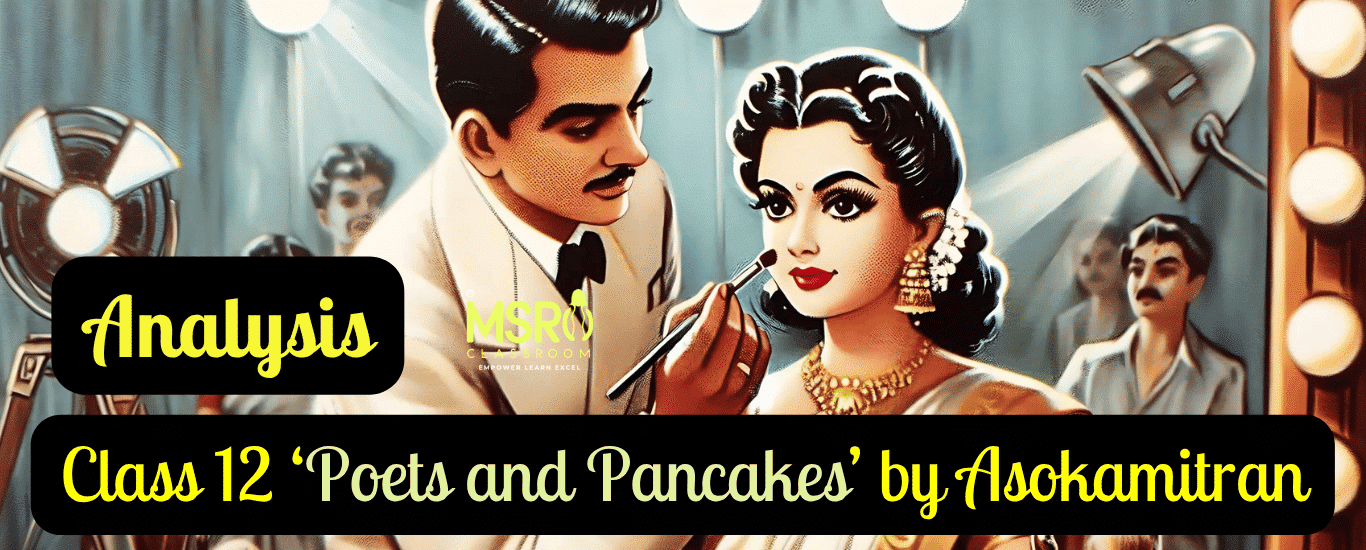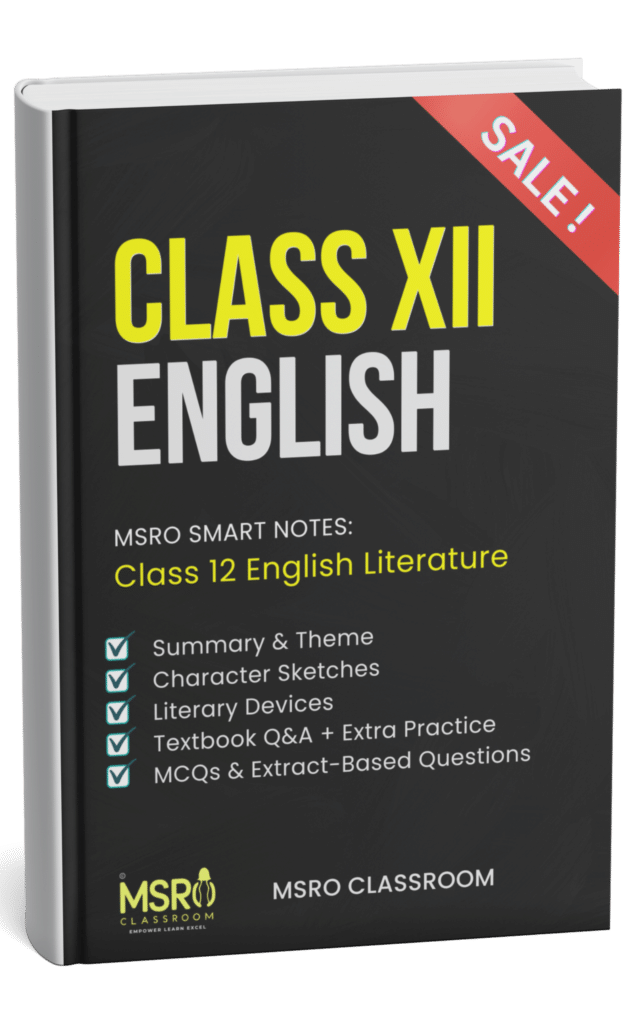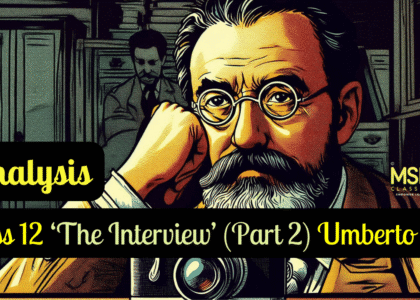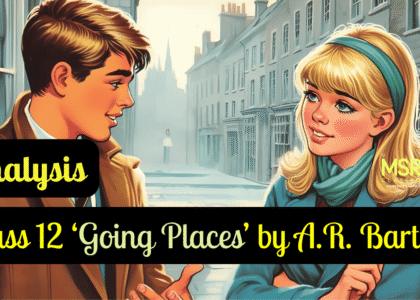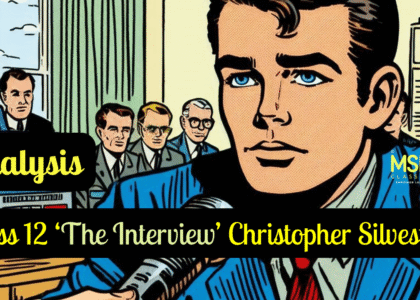Chapter 6, Asokamitran’s ‘Poets And Pancakes’ Explanation, Theme, Summary, Textbook Questions/Answers.
Chapter 6- Poets and Pancakes by Asokamitran:
Table of Contents:
Next on Flamingo: “Interview” Part I by Christopher Silvester , Part II “An Interview with Umberto Eco“
Summary ‘Poets And Pancakes’ by Ashokamitran :
The excerpt titled ‘Poets and Pancakes‘ from the book My Years with Boss by Asokamitran describes the atmosphere and dynamics within Gemini Studios in Madras, India. The makeup department and its strict hierarchy are portrayed, along with the resentment harboured by some employees towards the management.
The studio’s encounters with international visitors, including the Moral Re-Armament Army and Stephen Spender, highlight the cultural disparities and the studio’s need for familiarity with figures outside their immediate sphere.
The excerpt concludes with a personal reflection on the significance of encountering Stephen Spender’s writings years later and the interconnectedness of diverse cultural and intellectual realms.
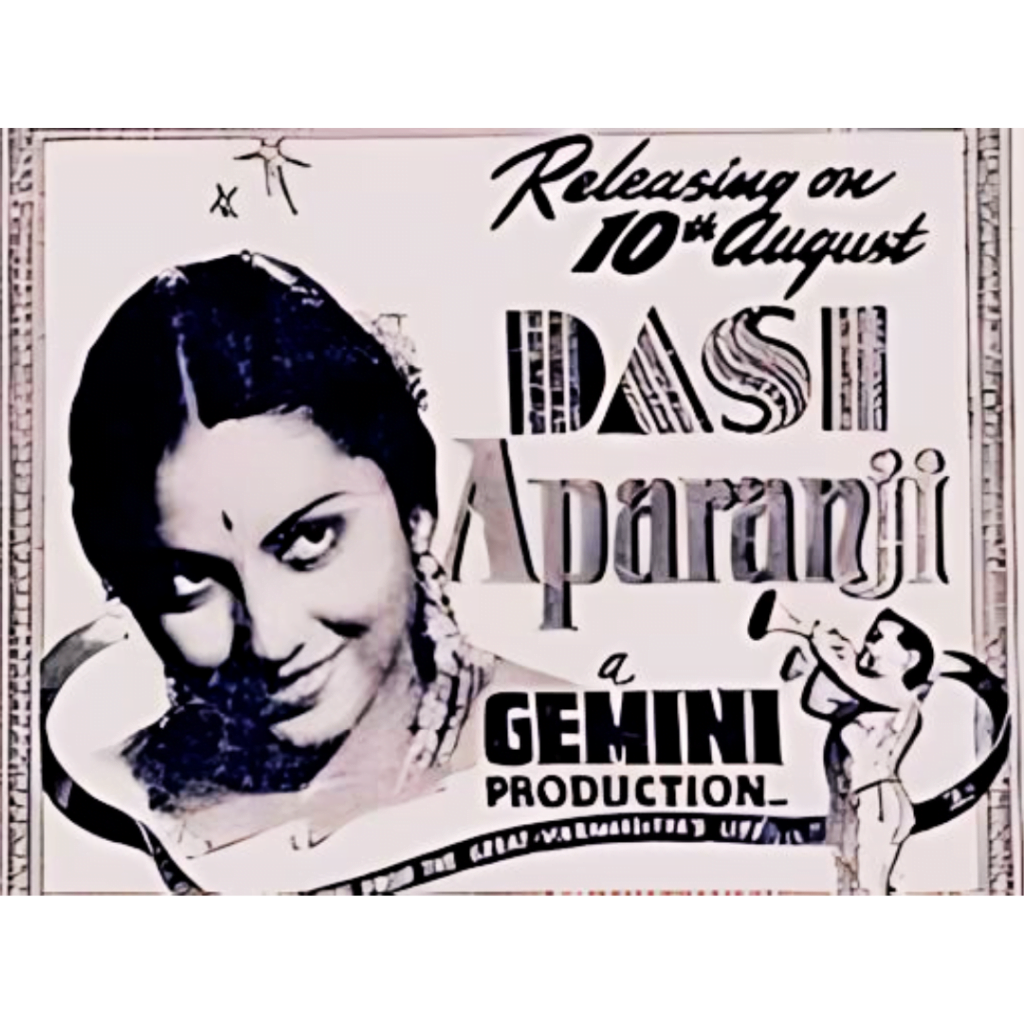
Theme ‘Poets And Pancakes‘:
- An excerpt from the book “My Years with Boss” by Asokamitran vividly portrays a film company’s inner workings and personalities during the early days of Indian cinema. The narrative focuses on Gemini Studios and its eclectic mix of individuals, including poets, writers, actors, and filmmakers. Here are the themes and sub-themes highlighted in the passage:
- An account of events and personalities in a film company: The passage provides insights into the dynamics, hierarchy, and daily activities within Gemini Studios, shedding light on the roles played by various individuals and their interactions.
Sub-theme:
Poets and writers in a film company environment: The excerpt explores the presence and influence of poets and writers within Gemini Studios. It delves into their backgrounds, creative pursuits, and interactions with other studio members.
Asokamitran’s narrative skillfully captures the atmosphere and ethos of Gemini Studios, offering readers a glimpse into the cultural and creative milieu of early Indian cinema. The passage paints a compelling portrait of a bygone era in the film industry through vivid descriptions and character sketches.
Explanation of ‘Poets and Pancakes’ for Auditory Learners:
Duration: 14 minutes
Chapters/ time stamps with English subtitles are available.
Textbook Questions/ Answers ‘Poets And Pancakes‘:
Think As You Read:
Q1: What does the writer mean by ‘the fiery misery’ of those subjected to make-up’?
A1: The writer refers to the “fiery misery” of those subjected to make-up to emphasise the discomfort and unpleasantness caused by the intense lighting and the application of heavy make-up, particularly under the incandescent lights used in the make-up room. The lights generated a lot of heat, making applying makeup uncomfortable for the actors and actresses.
Q2 What is the example of national integration that the author refers to?
A2: The example of national integration that the author refers to is the composition of the make-up department staff at Gemini Studios. The department was headed by individuals from different regions and linguistic backgrounds, including a Bengali, a Maharashtrian, a Dharwar Kannadiga, an Andhra, a Madras Indian Christian, an Anglo-Burmese, and local Tamils.
Despite their diverse backgrounds, they worked together harmoniously, showcasing a form of national integration that preceded official broadcasts on the theme.
Q3: What work did the ‘office boy’ do in the Gemini Studios? Why did he join the studios? Why was he disappointed?
A3: The “office boy” in the Gemini Studios’ make-up department was responsible for applying make-up to the crowd players. He joined the studios to become a star actor, screenwriter, director, and lyricist. Still, he was disappointed as he was assigned menial tasks such as mixing paint and applying make-up to the crowd players. Despite being in his early forties, he had yet to achieve the success he had hoped for in the film industry.
Q4: Why did the author appear to be doing nothing at the studios?
A4: The author appeared to be doing nothing at the studios because he was often seen tearing up newspapers at his desk. This activity made others, including the Boss, think that he was not engaged in productive work. Consequently, whenever someone felt he should be given some occupation, they would interrupt him with extended lectures. The author preferred crowd-shooting days as they provided a reprieve from such interruptions.
Q5: Why was the office boy frustrated? Who did he show his anger on?
A5: The office boy in the makeup department was frustrated because he felt that his literary talent was being wasted in a department he deemed fit only for barbers and perverts. He showed anger at Kothamangalam Subbu, the No. 2 at Gemini Studios.
Q6: Who was Subbu’s principal?
A6: Subbu’s principal was implied to be the head of Gemini Studios, referred to as “The Boss” in the excerpt.
Q7: Subbu is described as a many-sided genius. List four of his special abilities.
A7: Subbu is described as a many-sided genius with several unique abilities:
- He could contribute creatively to film productions, including suggesting alternative scenes and ideas.
- He was an accomplished poet known for addressing his poetry to the masses.
- He wrote a sprawling novel titled “Thillana Mohanambal” with well-etched characters.
- Subbu was a fantastic actor, capable of outperforming even the lead actors in subsidiary roles.
Q8: Why was the legal adviser referred to as the opposite by others?
A8: The legal adviser was referred to as “the opposite” because while officially known as the legal adviser, he was more known for recording incidents and potentially causing adverse effects, such as inadvertently ending a brilliant acting career.
Q9: What made the lawyer stand out from the others at Gemini Studios?
A9: The lawyer stood out from others at Gemini Studios because of his attire and demeanour. While others wore khadi and were associated with Gandhian principles, the lawyer wore pants, a tie, and sometimes a coat, which made him appear like a man of cold logic amidst dreamers. He was also called alone and helpless, indicating his contrasting presence in the studio environment.
Q10: Did the people at Gemini Studios have any particular political affiliations?
A10: The people at Gemini Studios generally leaned towards a Gandhian and Congress ideology, as evidenced by their preference for khadi clothing and their aversion to communism.
Q11: Why was the Moral Rearmament Army welcomed at the Studios?
A11: The Moral Rearmament Army (MRA) was welcomed at the Studios because their plays, despite being somewhat amateurish, presented professional performances that impressed the Tamil drama community. The plays had good sets and costumes, and their simple message resonated with the audience.
Q12: Name one example to show that Gemini Studios was influenced by the plays staged by MRA.
A12: One example showing the influence of the plays produced by MRA on Gemini Studios is the incorporation of scenes depicting sunrise and sunset in many Tamil plays following the style of ‘Jotham Valley’ by MRA.
Q13: Who was The Boss of Gemini Studios?
A13: The Boss of Gemini Studios was S.S. Vasan. He founded Gemini Studios and significantly shaped the Indian film industry during its early days.
Q14: What caused the lack of communication between the Englishman and the people at Gemini Studios?
A14: The lack of communication between the Englishman and the people at Gemini Studios can be attributed to several factors, including cultural differences, language barriers, and the unfamiliarity of the Gemini staff with the Englishman’s background and work.
Q15: Why is the Englishman’s visit referred to as unexplained mystery?
A15: The Englishman’s visit to Gemini Studios is referred to as an unexplained mystery because his presence and speech seemed inconsistent with the environment and interests of the people at the studio. His talk about the experiences of an English poet in a Tamil film studio was bewildering and left the audience baffled, as they could not relate to his subject matter or understand his accent.
Q16: Who was the English visitor to the studios?
A16: The English visitor to the studios was Stephen Spender.
Q17: How did the author discover who the English visitor to the studios was?
A17: The author found who the English visitor to the studios was when he came across a book titled “The God That Failed” on sale for fifty paise each on the footpath in front of the Madras Mount Road Post Office. This book contained essays by six eminent writers, one of whom was Stephen Spender, the same poet who had visited Gemini Studios.
Q18: What does The God that Failed refer to?
A18: “The God That Failed” refers to a book containing essays by six eminent writers who once supported communism but later became disillusioned with it. These writers recounted their personal experiences and reasons for abandoning communism in their essays.
Understanding the text:
Q1: The author has used gentle humour to point out human foibles. Pick out instances of this to show how this serves to make the piece interesting.
A1: The author employs gentle humour to point out human foibles throughout the piece.
- The description of the make-up department and its transformation of decent-looking individuals into hideous monsters with truck-loads of pancake and other potions and lotions.
- The portrayal of the “office boy” in the make-up department who harboured dreams of becoming a star actor or a top screenwriter, director, or lyrics writer despite being in his early forties. This adds a touch of irony to his character.
- The author’s experience of being subjected to extended lectures by the make-up department “boy” and his relief when praying for crowd-shooting to avoid such encounters.
- The depiction of Subbu’s demeanour and his ability to always look cheerful, even after facing difficulties, contrasts with the frustrations of the make-up department employee.
- The irony is that a lawyer, part of the Story Department, inadvertently ends a brilliant acting career by recording an actress’s tirade.
These instances of gentle humour add depth to the narrative and make it more engaging for the reader.
Q2: Why was Kothamangalam Subbu considered No. 2 in Gemini Studios?
A2: Kothamangalam Subbu was considered No. 2 in Gemini Studios because he played a significant role in the studio’s operations and creative endeavours. Despite his background and challenges, Subbu demonstrated loyalty to his principal (presumably the Boss of Gemini Studios) and dedicated his creativity to the studio’s advantage. His ability to generate ideas, provide inspiration, and contribute to the success of Gemini Studios made him a pivotal figure, earning him the position of No. 2.
Q3: How does the author describe the incongruity of an English poet addressing the audience at Gemini Studios?
A3: The author describes the incongruity of an English poet addressing the audience at Gemini Studios by highlighting the stark differences in cultural context and audience interests. The Gemini Studios primarily produced Tamil films for a simple audience whose lives didn’t afford them the luxury of cultivating a taste for English poetry.
The author and others at the studio are still trying to understand the presence of the English poet, reflecting the sheer mismatch between the audience’s expectations and the poet’s discourse. This mismatch highlights the situation’s absurdity and adds a layer of irony to the narrative.
Q4. What do you understand about the author’s literary inclinations from the account?
A4: From the account, it’s evident that the author has literary inclinations and a keen interest in exploring the intersection of literature, cinema, and human experiences.
The author’s engagement with literature is reflected in his curiosity about British publications, recognition of Stephen Spender’s significance, and reflections on the nature of prose writing and its relation to genius.
The author’s observations on the dynamics within Gemini Studios, including the roles of individuals like Subbu and the encounters with visiting poets and editors, highlight his interest in exploring the complexities of human interactions and creative endeavours.
Gemini Studios’ strategic decisions aimed at maximising profitability and maintaining competitiveness in the film industry.

